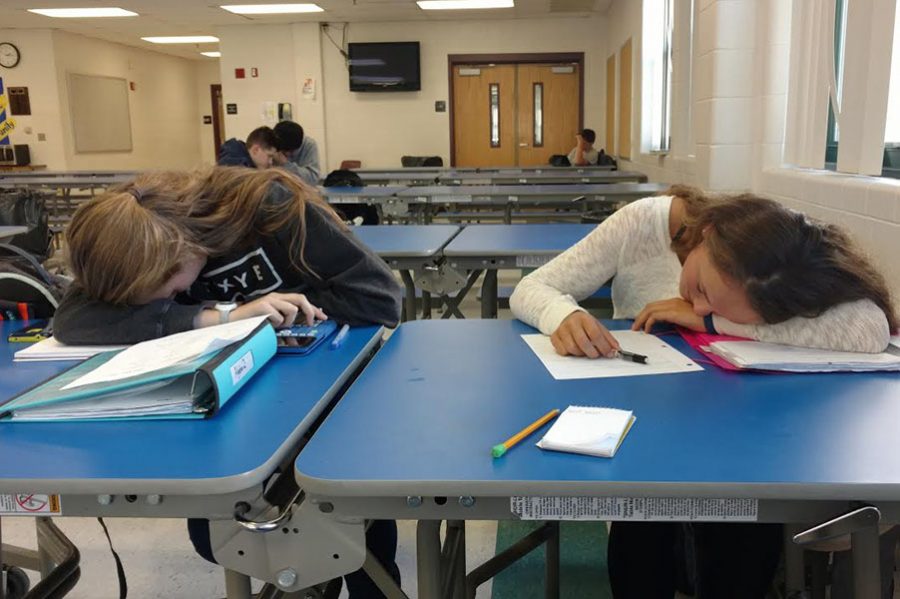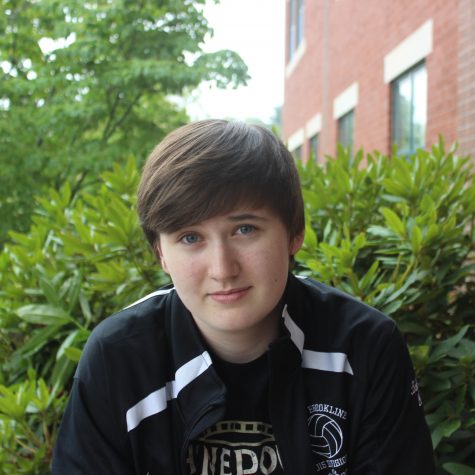Are you getting enough sleep?
Johanna Golden (left) and Katie Souza (right) are tired after a long night of homework.
November 2, 2016
Sleep deprivation can hinder the ability to remember, process, and write. The majority of high schoolers do not get enough sleep, and therefore have trouble learning.
According to Jane Bianchi, who wrote the article The Teen Who Woke Up Her School, sleep deprivation is because of a growth hormone, which is produced during puberty, that blocks melatonin, which causes drowsiness. If students are forced to wake up earlier, they will not sleep for as long as they should. Adolescents should receive averagely eight or nine hours, while adults should sleep seven hours. Lack of sleep results in students feeling like zombies in the morning, since teenagers are engineered to fall asleep and wake up later than younger children or adults.
James Maac, CEO of Sleep for Success, has put countless hours of research into the subject. He even appeared on TEDMED and stated: “When you are sleep deprived, you lack the ability to remember, to process, to think creatively, to make critical decision skills, to multi task, to speak well, to write well.”
Sleep is crucial for adolescents, and can become a dangerous health issue. Maac discusses health later in the TEDMED talk.
“…it affects heart attacks and strokes…type two diabetes, obesity – a major problem – and now cancer.” Multiple studies, like the Academy’s Adolescent Sleep Working Group, have confirmed this.
Hollis Brookline High school starts the day at 7:15 am until 2:24 pm, while other schools start at 7:35 am and end at 2:15 pm. Many differ on which time should be applied, but a common fact is how a change of start time can affect the end time, sometimes in a negative way.
Rich Winslow, guidance counselor at Hollis Brookline High School, is in favor of students getting more sleep, but offered some counterpoints for altering the start time. He says, “…it will change the sport time, and students cannot connect with teachers.” If the start time is pushed later, concerns might arise with the shortened day. This would not be beneficial, because it would cause the same problem that it’s trying to fix. The later end time would push all other extracurricular activities into the late afternoon. If students are in sports, homework for the night will be finished later at night causing students to stay up late and get little to no sleep.
Maggie O’Hara ‘17, along with other members of Hollis Brookline’s Student Council, proposed a later start time to the Hollis Brookline Cooperative (COOP) School Board on May 20, 2015. The Council created and presented facts on sleep deprivation and its impact on adolescents. “The members were very welcoming,” O’Hara said, “and, I think [they] really embraced the idea.”
The presentation was a major push forward for students, because the school board considered the points that were brought up. As a result, a separate committee was created for the sole purpose of discussing altering the start time. The members include students, teachers, and administrators and have met almost every month.
On Wednesday, October 19, Student Council presented two different start times. The board agreed with the points Student Council presented, and added several suggestions. The start time committee will be meeting again this Friday, November 4.













